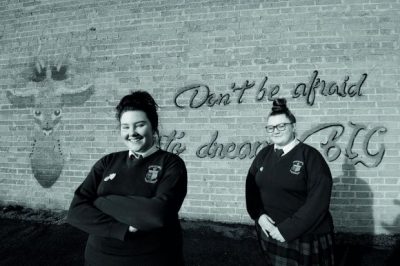Inchicore Girls go Viral with video calling for More Amenities
An innovative video from a number of students Mercy Secondary School Inchicore has gone viral, as they voice their honest thoughts of growing up in the area.
The video was made by Transition Year students at Mercy Secondary School, demanding improvements to the area’s facilities and for improvements in the upkeep of the area as part of their ‘Give Mercy to Inchicore’ project.
They have also conducted a survey within their school on whether others think Inchicore is safe – only 51% said yes – or if they have experienced anti-social behaviour in the locality, to which 71% of respondents said yes.
Speaking to Dublin Gazette, the group said: “We were inspired to make a change and make Inchicore a better place to live; we want to feel safer in our community.
“We wanted to voice our opinions and put forward our suggestions to make improvements and be involved in the community’s development. We want to seek new opportunities.
“The lack of amenities and opportunities presented in our area is worrying and we wish to contact people in power who can help us make a change and offer us the advantages that teens from other more well-off areas have access to.
“The youth here in Inchicore are hugely inspiring and with more facilities we could achieve wonderful things.”
The impact that the video has had has led to the girls visiting the Seanad alongside local senator Catherine Ardagh.
The group said they believe engaging with local councillors and senators is a way of making ‘impactful’ change for their area.
“We feel that making connections with local TDs, senators and councillors can be very informative and impactful.
“Social media has been an astounding platform that we have used to our advantage in voicing and promoting our concerns and hopefully what we have shared will inspire other teenagers to have their voice heard too.”
https://www.facebook.com/932110360332725/videos/397584800979678/
Article taken from Dublin Gazette
Inchicore girls go viral with a video calling for more amenities
Older people are voting for our future
On a Saturday, 17-year-old Katie Browne and Kym Fallon of Mercy Secondary School in Inchicore, are helping to host a party for some children living in direct provision. “This is education too,” says Kym, who lives in Drimnagh. “There are people out there doing grinds today but we’re here learning through this, learning about people.”
They’re both involved with the school’s College for Every Student programme, which is run with the Trinity Access Programme (Tap) and provides mentoring, leadership training and information on getting to college.
Mercy is a small Deis (Delivering Equality of Opportunity in Schools) school with 170 girls. I’m introduced to the group by Social Democrat councillor Gary Gannon, who works in outreach with the Tap. They’re all very close.
Before the interview the whole class vets me first. Many of them will be among the first generation of their families to go to university, though both Katie and Kym seem to have very supportive parents. “My da keeps wanting to learn now,” says Katie, who lives in Ballyfermot. “He’s obsessed with learning.”
Katie wants to go to the National College of Art and Design (NCAD) and become an art teacher, ever since they went on a tour there. “I said this is my college.”
Kym can’t make up her mind between politics, business, music and midwifery. She’s also really good at maths, says Katie, and is frequently called on to explain things to the class.
They’re both well aware of educational inequality. “I think it’s 99 per cent go to third level in certain parts of Dublin whereas the percentage in Dublin 8 is 28 per cent,” says Katie. “But this school is 64 per cent.”
In some parts of Dublin, says Kym, “their life is set for them. They’re going to go to this school, this secondary school, this college. Most kids like that are following what their parents did, they’re becoming doctors or they’re becoming lawyers.”
In contrast, facing a college career can be overwhelming if no one in your family has gone before. “If I asked my mam about CAO forms, she wouldn’t know,” says Katie.
Do they feel any stigma about it? “We get a lot of opportunities to go into different colleges and with our accent you think people will look down on you,” says Kym.
“There’s a stigma that if you talk like I would, you’re not intelligent,” says Katie. “I don’t think that any more. Everybody’s proving me wrong . . . We went to Trinity for a while and we’d go in on open days and people would look at you because we’re like, ‘Oh heya!’”
On a Saturday, 17-year-old Katie Browne and Kym Fallon of Mercy Secondary School in Inchicore, are helping to host a party for some children living in direct provision. “This is education too,” says Kym, who lives in Drimnagh. “There are people out there doing grinds today but we’re here learning through this, learning about people.”
They’re both involved with the school’s College for Every Student programme, which is run with the Trinity Access Programme (Tap) and provides mentoring, leadership training and information on getting to college.
Mercy is a small Deis (Delivering Equality of Opportunity in Schools) school with 170 girls. I’m introduced to the group by Social Democrat councillor Gary Gannon, who works in outreach with the Tap. They’re all very close.
Before the interview the whole class vets me first. Many of them will be among the first generation of their families to go to university, though both Katie and Kym seem to have very supportive parents. “My da keeps wanting to learn now,” says Katie, who lives in Ballyfermot. “He’s obsessed with learning.”
Katie wants to go to the National College of Art and Design (NCAD) and become an art teacher, ever since they went on a tour there. “I said this is my college.”
Kym can’t make up her mind between politics, business, music and midwifery. She’s also really good at maths, says Katie, and is frequently called on to explain things to the class.
They’re both well aware of educational inequality. “I think it’s 99 per cent go to third level in certain parts of Dublin whereas the percentage in Dublin 8 is 28 per cent,” says Katie. “But this school is 64 per cent.”
In some parts of Dublin, says Kym, “their life is set for them. They’re going to go to this school, this secondary school, this college. Most kids like that are following what their parents did, they’re becoming doctors or they’re becoming lawyers.”
In contrast, facing a college career can be overwhelming if no one in your family has gone before. “If I asked my mam about CAO forms, she wouldn’t know,” says Katie.
Do they feel any stigma about it? “We get a lot of opportunities to go into different colleges and with our accent you think people will look down on you,” says Kym.
“There’s a stigma that if you talk like I would, you’re not intelligent,” says Katie. “I don’t think that any more. Everybody’s proving me wrong . . . We went to Trinity for a while and we’d go in on open days and people would look at you because we’re like, ‘Oh heya!’”
“But to turn it on its head a little bit,” says Kym. “Now when we walk into Trinity it’s like ‘Hey, it’s the Mercy girls!’”
Is it important to see people out there in public life with accents like theirs? “People in power come from places like D4 and you’re expecting to see that,” says Kym. “When you start seeing people in power from Inchicore, Ballyfermot and Crumlin, I think it is sort of inspiring. A few of my friends are just turned 18 and can’t wait for a good referendum to come up so they can just vote.”
They feel hugely supported in the school. They have an English teacher who gives them tea and biscuits when teaching the more depressing poems and a principal, Michelle O’Kelly, who they feel they can go to with any problem. “I think if I was in any other school, I wouldn’t still be in school,” says Katie.
“I don’t think so either,” says Kym.
“Third year kind of knocked it out of me,” says Katie. “I didn’t expect the Junior Cert to be as stressful as it was.”
They talk about the pressure of the Leaving Cert and its focus on rote learning over project work, which they think they would prefer. And they talk about their part-time jobs and the financial pressure college will bring. “If I don’t get a grant, I don’t know how I’m going to go to college,” says Katie. “I’m looking for jobs now, so I can start saving up.”
When I ask about what the big issues are for their peers beyond education, they mention teenagers being obsessed with expensive brands and social media, two things Kym and Katie seem capable of raising their eyebrows at.
What did they think of the recent referendums? “It makes me really proud,” says Katie.
Why? “Because you know most of the people voting ‘yes’ on that stuff are people from our generation,” says Kym. “A lot of kids my age went to the marches even though they couldn’t vote.”
They both wish they could have voted. “Older people are voting for our future,” says Katie. “We grow up into their decisions, but we don’t really get a say . . . A few of my friends are just turned 18 and can’t wait for a good referendum to come up so they can just vote.”
“We’re a very political class,” says Kym. “If we have an issue with something, it’s getting changed.”
This manifests on a micro level. They recently agitated to make sure physics was taught in the school. They also refurbished an unused storage room into “a 21st century learning space”.
“I think we’re such a girl-power school,” says Katie. “That sounds very cringy, but I never thought I was less than a fella.”
“It’s true,” says Kym. “We don’t take anything from anyone.”
“Even with Gary [Gannon],” says Katie. “Gary will say something and we’ll be like ‘Sit down, Gary. Don’t start.’”
Article taken from The Irish Times

